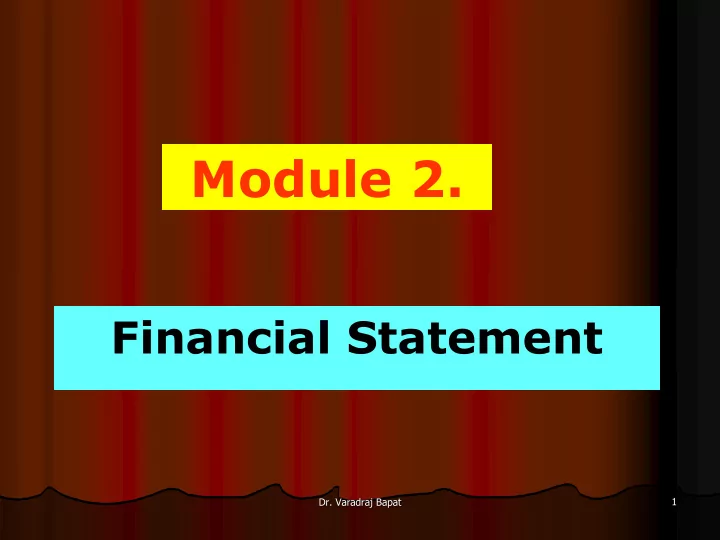

Module 2. Financial Statement Dr. Varadraj Bapat 1
Financial Statements Profit and Loss Account Elements of P & L A/c Entity Concept Accrual Basis of Accounting Matching Concept Prepaid Expenses & Outstanding Expenses Realisation Concept Dr. Varadraj Bapat 2
Profit and Loss Account Profit and loss account discloses the result of the working of an entity during the accounting year. Profit and loss account measures the income generated by the entity. Dr. Varadraj Bapat 3
Elements of Profit and Loss Account Income Expenses Dr. Varadraj Bapat 4
Profit & Loss A/c (Simple Format) Particulars Amount Sales XX Cost of Goods Sold (XX) Gross Profit XX Other Expenses (XX) Tax (XX) Net Profit XX Dr. Varadraj Bapat 5
Particulars Year Year Ended Ended (format as per revised 31st 31st schedule VI ) Mar Mar 2011 2010 I. Revenue from Operations - - II. Other Incomes - - III. Total Revenue (I + II) - - Dr. Varadraj Bapat 6
IV. Expenses: Cost of Materials Consumed - - Purchases of Stock-in-Trade - - Changes in Inventories of Finished Goods, Work-in- - - Progress and Stock-in-Trade Dr. Varadraj Bapat 7
Employee Benefit Expenses - - Finance Costs - - Depreciation and Amortization Expense - - Total Expenses - - V. Profit before Exceptional and Extraordinary Items - - and Tax (III - IV) Dr. Varadraj Bapat 8
VI. Exceptional Items - - VII. Profit before Extraordinary Items and Tax (V - VI) - - VIII. Extra Ordinary Items - - IX. Profit before Tax (VII - VIII) - - Dr. Varadraj Bapat 9
X. Tax Expense: (1) Current tax - - (2) Deferred Tax - - XI. Profit/ (Loss) for the period from Continuing - - Operations (IX - X) XII. Profit/Loss from Discontinuing Operations - - Dr. Varadraj Bapat 10
XIII. Tax Expense of Discontinuing Operations - - XIV. Profit/(Loss) from Discontinuing Operations - - (after Tax) (XII - XIII) XV. Profit/ (Loss) for the Period (XI + XIV) - - Dr. Varadraj Bapat 11
Income Income is the increase in economic benefits during the accounting period in the form of inflows or enhancement of asset or decreases of the liability. The definition of income encompasses revenue and gains. Revenue is an income that arises in Dr. Varadraj Bapat 12
the ordinary course of activities. e.g. sales Gains are income, which may or may not arises in the ordinary course of activities. e.g. profit on sale of fixed asset Dr. Varadraj Bapat 13
Expenses Expense is the decrease in economic benefits during the accounting period in the form of outflows or depletion of asset or incurrence of the liability. Expense arises in the ordinary course of activities. e.g. wages Dr. Varadraj Bapat 14
Losses may or may not arises in the ordinary course of activities. e.g. loss on sale of fixed asset Dr. Varadraj Bapat 15
Entity Concept The Entity concept of an accounting practice states that the business enterprises is a separate identity apart from its owner. ◊ Business transaction are recorded in the books of business books of accounts and owners transaction in his personal books of accounts. ◊ This concept helps in keeping Dr. Varadraj Bapat 16
business affairs free from the influence of the personal affairs of the owner. ◊ Entity concept means that enterprises are liable to owner for capital investment made by the owner. ◊ Since the owner invested capital, which is also called risk capital he claim on the profit of the enterprise. Dr. Varadraj Bapat 17
Accrual Basis of Accounting • Transaction are recognised as soon as they occur, whether or not cash is actually received or paid. • Accrual basis ensures better matching between revenue and cost of the enterprise during an accounting period. • Accrual means recognition of revenue and cost as they are earned or Dr. Varadraj Bapat 18
Matching Concept The matching concept is an accounting practice whereby expenses are recognized in the same accounting period when the related revenues are recognized. The matching concept thus helps avoid misstating earnings for a period. Reporting revenues for a period without reporting the costs of producing those revenues would result in overstated profits. Dr. Varadraj Bapat 20
Prepaid and outstanding Expenses: Matching concept is based on the accrual concept as it considers the occurrence of expenses and income and do not concentrate on actual inflow or outflow of cash. This leads to adjustment of items like prepaid and outstanding expenses. Dr. Varadraj Bapat 21
Realisation Concept Any change in the value of an asset is to be recorded only when the business realise it. When an asset is recorded at its cost of Rs. 15 Lakhs and even if its current cost is Rs. 45 Lakhs such change is not counted unless there is certainty that such change will materialise. Dr. Varadraj Bapat 22
However, we follow a more conservative path. We try to cover all probable losses but do not count any probable gain. That is to say, if we anticipate decrease in value count it, but if there is increase in value ignore it until it is realised. Dr. Varadraj Bapat 23
Recommend
More recommend